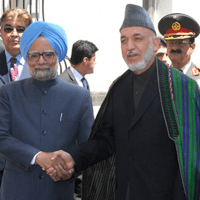Indian Prime Minister Manmohan Singh landed in Kabul last week amid renewed interest in India's trajectory in Afghanistan following the death of Osama bin Laden. Singh, in Afghanistan after a six-year absence, announced a fresh commitment of $500 million for Afghanistan's development, over and above the $1.5 billion in aid India has already allocated. New Delhi and Kabul agreed that the two neighbors' "strategic partnership" will be implemented under the framework of a partnership council to be headed by the countries' foreign ministers. It will entail cooperation in security, law enforcement and justice, including an enhanced focus on cooperation in the fight against international terrorism, organized crime, illegal narcotics trafficking and money laundering.
In a rare honor, Singh addressed a joint session of the Afghan Parliament, underscoring Indo-Afghan unity in fighting extremism. Describing bin Laden's death as a "unique moment," Singh tried to use India's political capital to reinforce New Delhi's centrality in the region's evolving strategic realities. Only weeks ago, the Pakistani military was urging Kabul to dump the U.S. and look instead to Pakistan and its ally China for help in striking a peace deal with the Taliban and rebuilding the economy. Just last month, Kabul and Islamabad announced the establishment of a two-tier joint commission that gave the Pakistani military a formal role in reconciliation talks between Kabul and Pakistan-based insurgents.
In contrast, India's options in Afghanistan have shrunk over the past few years, despite its success at winning the hearts and minds of ordinary Afghans. The fault lies entirely with New Delhi. By failing to craft its own narrative on Afghanistan and Pakistan following the arrival of U.S. troops in the aftermath of Sept. 11, New Delhi has allowed the West, and increasingly Pakistan, to dictate the contours of Indian policy towards the region.

